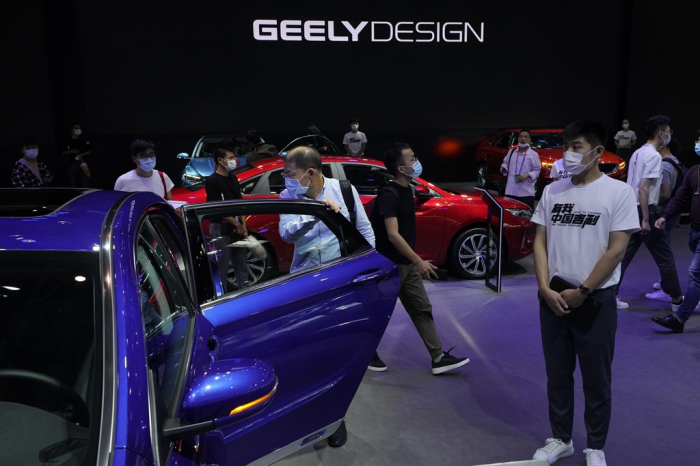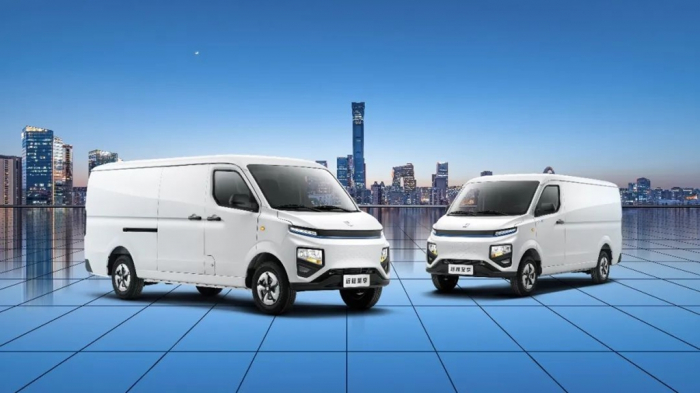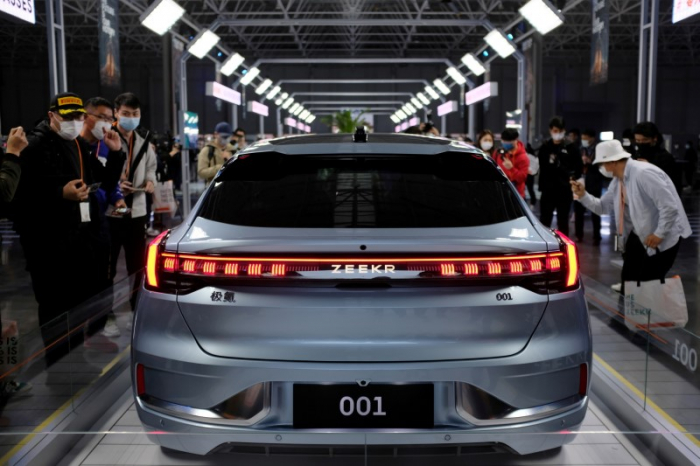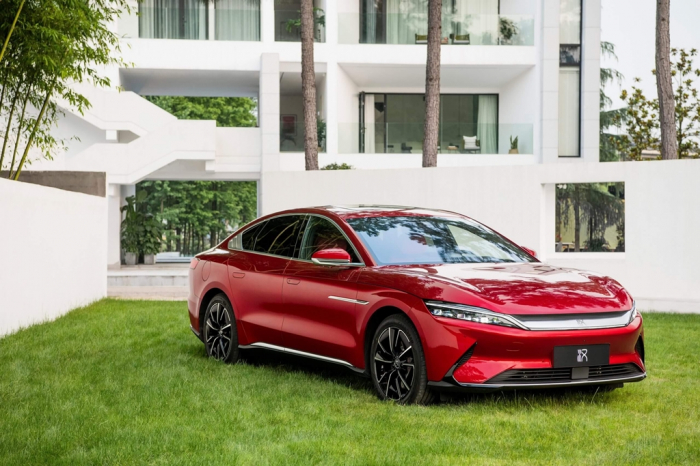Electric vehicles
China’s Geely challenges Hyundai with entry to Korea’s e-truck market
Geely’s aggressive advance into the Korean market contrasts with Hyundai’s struggling sales in China
By Feb 23, 2022 (Gmt+09:00)
4
Min read
Most Read
LG Chem to sell water filter business to Glenwood PE for $692 million


Kyobo Life poised to buy Japan’s SBI Group-owned savings bank


KT&G eyes overseas M&A after rejecting activist fund's offer


StockX in merger talks with Naver’s online reseller Kream


Mirae Asset to be named Korea Post’s core real estate fund operator



China’s largest privately owned carmaker Zhejiang Geely Holding Group Co. is entering South Korea’s electric truck market to compete with two dominant local players – Hyundai Motor Co. and Kia Corp.
Geely, a leading Chinese electric vehicle maker, has teamed up with Myoung Shin Co., a Korean auto parts company, to jointly develop, manufacture and sell small-size electric trucks in Korea, officials said on Wednesday.
The two companies signed a collaboration contract at Geely’s headquarters in Hangzhou on Feb. 21.
Geely and Myoung Shin will develop a 1.5-ton electric truck, a variant of the Chinese company’s next-generation small electric model called e51, for Korean consumers.
The new model tailored to the Korean market and eventually targeting other overseas markets will be produced at Myoung Shin’s plant in Gunsan, Korea, which was previously owned by General Motors.
The production will begin in June next year with an initial volume of 4,000 units a year, according to the officials. The partners also plan to produce much larger 8-ton electric pickup trucks later, raising their annual sales target to 30,000 units in Korea by 2025.

Industry watchers say their goal is ambitious, as their 2025 sales target represents more than a third of the Korean electric truck market, which is forecast to grow to 80,000 units by that year.
The electric truck will be equipped with batteries developed by China’s Contemporary Amperex Technology Co. Ltd. (CATL), the world’s top battery maker, and runs 250 km on a single charge, about 30 km longer than the current e-trucks made by Korean companies.
“If the Chinese electric trucks are priced competitively against their Korean rivals, which are Hyundai and Kia, the new cars could change the e-truck landscape in the local market, posing a serious threat to Korean companies,” said an auto analyst.
Currently, the Korean market is dominated by Hyundai’s Porter 2 Electric and Kia’s Bongo 3 Electric.
ALREADY INTIMIDATING IN KOREA
Geely has been aggressively expanding its business into future mobility. Last year, it set up a joint venture with China’s top internet portal Baidu Inc. to develop self-driving car technology.
The Chinese automaker purchased a controlling stake in German automaker Daimler AG in 2008 and acquired the Swedish passenger carmaker Volvo Cars from Ford Motor Co. in 2010. It also owns British premium brand Lotus Cars and Swedish electric car startup Polestar.

More recently, Geely said earlier this week that it has joined hands with France's Renault to jointly design and produce electric hybrid and gasoline-fueled vehicles in Korea for sale there as well as for export.
The vehicles will be manufactured at the Renault-Samsung facility in Busan with production forecast to begin in 2024.
Earlier this year, Polestar launched the Polestar 2, its first fully electric, high-volume model, in Korea to gain a share in the local EV market.
According to government data, 2,838 electric buses were newly registered in Korea last year, of which 890 units, or 31.4%, were made by Chinese companies. The ratio increased from 27.7% in 2020 and 24.8% in 2019.
Chinese electric buses also offer competitive pricing. Korean electric buses are sold at over 300 million won ($251,700) a unit, while the Chinese counterparts are priced at around 200 million won. With a state subsidy, Chinese electric buses are available at half the price in Korea.
HYUNDAI STRUGGLING IN CHINA
Meanwhile, Hyundai and Kia, the two automaking units of Hyundai Motor Group, are struggling in China, the world’s largest car market, with weak sales there.
Industry data showed Hyundai Motor’s Chinese sales in 2021 stood at 350,277 units, down 20.4% from the previous year. Kia’s sales in China nearly halved to 127,005 cars.
The two Korean automakers’ sales in China have been declining since 2016 amid aggressive marketing by their global rivals and in the aftermath of a diplomatic dispute between Seoul and Beijing over the deployment in Korea of a US anti-missile system in 2017.

The Korean companies’ heavy sedan-focused lineups in China also contributed to their lackluster sales there amid a worldwide boom of sport utility vehicles, analysts said.
Earlier this week, Hyundai Motor said it has suspended its factory operations in the southwestern city of Chongqing due to weak sales.
The Chongqing plant is one of four factories run by Beijing Hyundai, a joint venture between Hyundai Motor and China's BAIC Motor Corp.
Beijing Hyundai spent about 1.6 trillion won to build the Chongqing factory in 2017. With an annual production capacity of 300,000 units, the plant has mostly produced localized Hyundai models such as the Verna and Encino.
Hyundai sold one of its factories in Beijing to the Chinese city government last year, which later was acquired by Li Auto, a Chinese electric vehicle maker, formerly known as Lixiang Automotive.
As part of its efforts to revive sales in China, Hyundai Motor in November of 2021 unveiled an electric variant of the GV70, a premium SUV under its standalone Genesis brand, at the Guangzhou International Automobile Exhibition.
Write to Il-Gue Kim, Hyung-Kyu Kim and Byung-Uk Do at Black0419@hankyung.com
In-Soo Nam edited this article.
More to Read
-
 Electric vehiclesHyundai launches electrified GV70’s global premiere in China to boost sales
Electric vehiclesHyundai launches electrified GV70’s global premiere in China to boost salesNov 19, 2021 (Gmt+09:00)
2 Min read -
 Mobility fundsSK Holdings, China’s Geely launch $300 million future mobility fund
Mobility fundsSK Holdings, China’s Geely launch $300 million future mobility fundMar 18, 2021 (Gmt+09:00)
2 Min read -
 EV parts makersKorean auto parts players to shine as carmakers go all in on EVs
EV parts makersKorean auto parts players to shine as carmakers go all in on EVsFeb 08, 2021 (Gmt+09:00)
3 Min read -
 Investment fundsSK, China’s Geely eye investment fund for hydrogen, eco-friendly business
Investment fundsSK, China’s Geely eye investment fund for hydrogen, eco-friendly businessJan 27, 2021 (Gmt+09:00)
2 Min read
Comment 0
LOG IN


